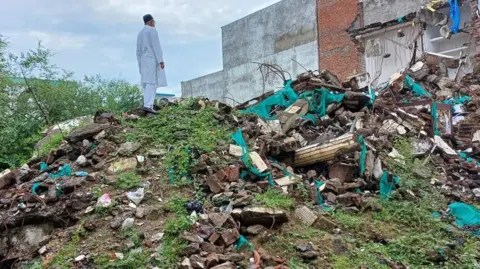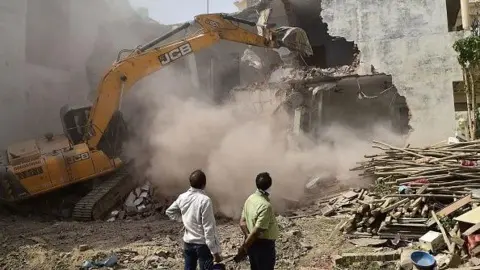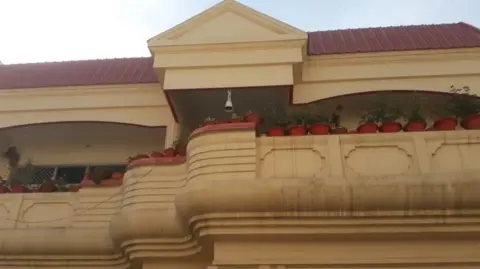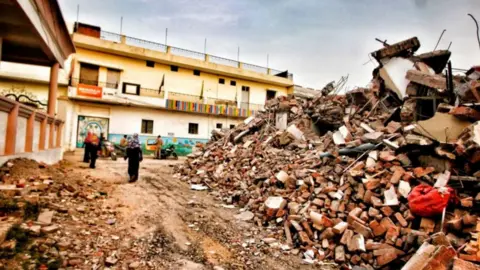 Afreen Fatima
Afreen Fatima“You can be homesick at home, you know?”
That’s how Afreen Fatima, an activist from the northern Indian city of Prayagraj, finds herself feeling, every now and then.
In the summer of 2022, Ms Fatima’s childhood home – a yellow-brick two-storeyed house in the bustling depths of the city – was torn down by authorities overnight.
The house was demolished after her father, a local politician named Javed Mohammad, was arrested and named as the “key conspirator” of a protest by Muslims, which had turned violent.
He denies the allegations, and has never been found guilty of any crime linked to the June 2022 protests.
The family is just one of many who have found themselves at the mercy of so-called “bulldozer justice” – when authorities swiftly demolish the homes of those accused of crimes – but hopefully among the last.
On Wednesday, India’s top court banned the practice which has been on the rise in recent years, particularly in states governed by Prime Minister Narendra Modi’s Bharatiya Janata Party (BJP).
While the victims include Hindu families, critics say the action is mostly targeted at India’s 200 million odd Muslims, especially after religious violence or protests – a charge the BJP denies.
Chief ministers of several states have linked such demolitions with their government’s tough stance on crime. Officially, however, the reason given is that these structures were illegally constructed.
Experts have repeatedly questioned this, saying that there is no legal justification for it and that punishing someone for an alleged crime using laws meant for another makes no sense.
 Getty Images
Getty ImagesMs Fatima says that during the 20 months that Mr Mohammad spent in jail – he got bail earlier this year – she and her family moved houses twice in the city.
It took some effort, but they finally feel settled. Still, there are times when their new house feels strangely unfamiliar to her, she says, like an “adopted space” which has not been lived in enough.
“It’s not the same. I spent most of my life in our old house. There are no memories here, it feels empty,” she says.
So when the court was reading out its judgement this week, Ms Fatima was hopeful of finally getting some closure.
But the outcome turned out to be bittersweet.
Because, while the court has outlawed authorities from arbitrarily razing down homes and businesses of those accused or convicted of crimes, it did not mention any form of redressal to families like Ms Fatima’s, who’ve been the victims of such demolitions in the past.
“We welcome the judgement, but what about those of us who have already lost our homes?” she says.
 Somaiya Fatima
Somaiya FatimaThe practice had become commonplace: in 2022, authorities in five states bulldozed 128 structures in just three months “as punishment”, a report by Amnesty international shows.
In its order, which ran over 95 pages, the court came down heavily on the state governments, saying it cannot “become a judge and decide that a person accused is guilty and, therefore, punish him”.
Giving out such punishment “reminds one of a lawless state of affairs, where might was right”, the judgement added.
The court then issued a set of guidelines, which make it mandatory for authorities to give at least 15 days’ advance notice to an occupant before an illegal structure is torn down and to publicly explain the reason for the demolition. All public officials will also be personally held responsible under Indian laws if a demolition is carried out wrongfully, the judgement added.
Rights groups, lawyers and opposition leaders have hailed the order as a “turning point” in tackling the unfair practice that has gone unchecked for years. “Late is the hour in which these guidelines chose to appear – but better late than never!” said Delhi-based lawyer Gautam Bhatia.
Govind Mathur, a judge and former chief justice of a high court, agrees that the order does not mention anything about the victims, but adds that “doesn’t restrict any claim of compensation by such persons”.
“If an act is illegal, then the victim can always demand for compensation. The wrong committed will remain a wrong and the cost of that has to be paid by the wrong doers,” he says.
The order, Justice Mathur adds, is a “strong message for state machinery to not align with political bosses but to act in accordance with law”.
 Somaiya Fatima
Somaiya FatimaMs Fatima, however, points out that the reality is not that simple.
It’s been more than two years since her family first challenged the demolition in a high court. But there hasn’t been a single hearing, she says.
She still remembers the day it all happened. Onlookers glued themselves to the corner to watch for the excavator as it came down on their house. Many of them held cameras and phones. Ms Fatima, who watched the demolition on her own phone from a relative’s house, remembers going numb.
She thought of her room and the sheer volume of keepsakes and furniture stored there. There were stories everywhere – precious everyday memories, like the time she spent with her sister and the lively family discussions around the dinner table. “All of that was gone,” she says.
While Ms Fatima’s family was able to rebuild their lives in some capacity, others say they are still stuck in limbo.
“We are practically on the streets, with nothing and no one,” says Reshma, a daily wage worker in Rajasthan state. In September, Reshma’s house in Udaipur city was demolished on grounds of illegal encroachment, a day after her eight-year-old brother allegedly stabbed his classmate.
The child was taken into custody and sent to a juvenile home, while his father was arrested on the charges of abetment to murder. Since then, Reshma, her mother and sister have been living in a small shanty on the edges of the city.
To them, the court ruling is meaningless, she says. “We want actual help, some money or compensation to rebuild our lives, this changes nothing.”
 Vivek Singh
Vivek SinghLike Ms Fatima, Reshma’s family has also challenged the demolition in court. Legal experts say that the Supreme Court’s guidelines could potentially impact the way all such pending cases are heard in the future.
“This decision will change many things – courts will have to see whether legal processes were followed while carrying out these demolitions,” senior Supreme Court lawyer CU Singh told BBC Hindi.
Ms Fatima is not entirely sure whether the court’s order would actually halt the demolitions.
But her father, Mr Mohammad, is brimming with hope, she says.
Sometimes, she catches her father thinking about their old home – the sofas and the rugs, the rows of books on the shelves, which he had painstakingly put together, probably still lying in the rubble.
“He did most of the improvements, from the curtains to the cushion covers. Losing the house broke his heart more than anyone else’s,” she says.
But Mr Mohammad does not want to linger on the suffering and is already busy making fresh improvements to the house and his life. “He keeps telling me, this is a historic order and we have to talk about it as much as we can,” his daughter says.
“Just like this house, we are building lives again and renovating our memories.”

















